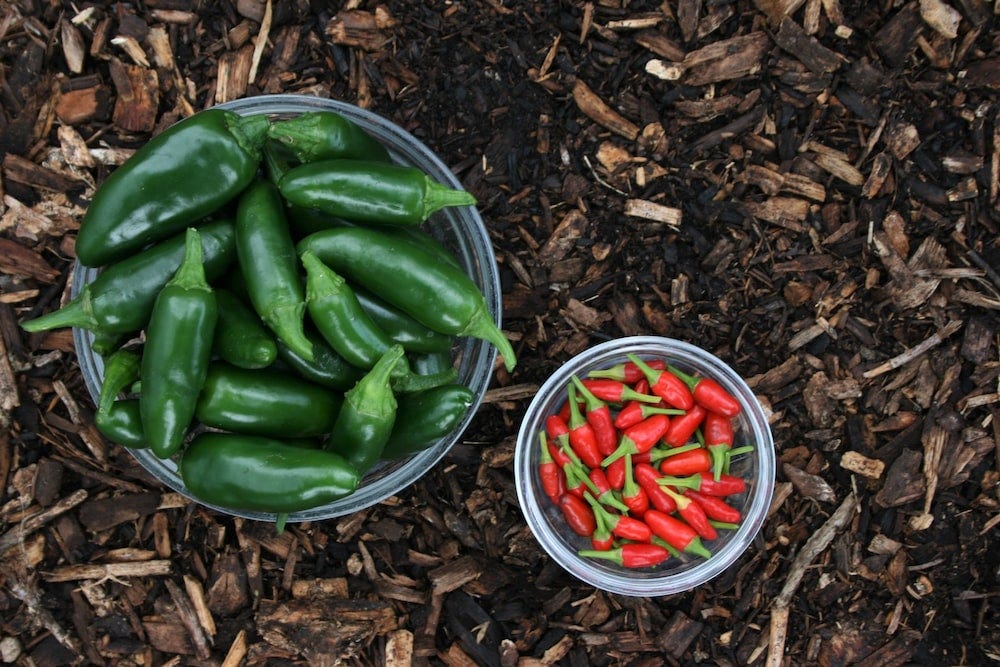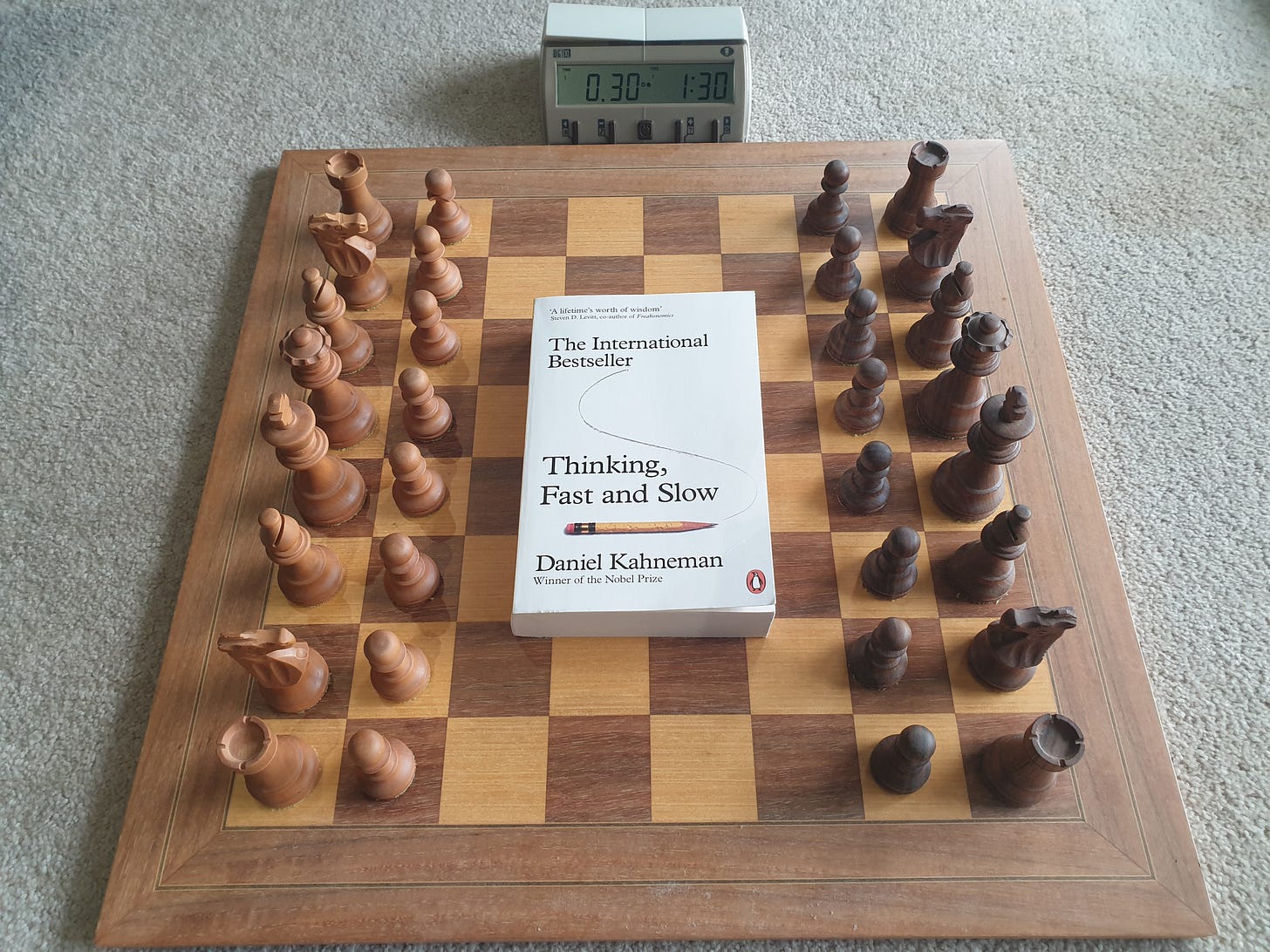Thinking, Fast and Slow: 5 Lessons for Chessplayers
That might make you smile more during your next chess game
Your brain employs two systems of thinking for everything.
System 1 (fast thinking) — intuitive, automatic, without conscious thought
System 2 (slow thinking) — deliberate, conscious, requires concentration
Going from this premise, Nobel prize-winning psychologist and economist Daniel Kahneman's bestseller discusses a multitude of cognitive biases and behavioural quirks we've all developed.
Here are 5 topics from the book that are interesting to apply to the 64 squares.
1. Cognitive strain—should you smile or frown more during games?
If you want to trust your intuition more, smile, or even force a smile. Your brain associates it with cognitive ease, a state in which our brain thinks things are good, we're comfortable, so it's easier to trust our gut.
If you want to slow things down and be extra careful, try frowning—your brain will associate this with cognitive strain, a state where we are vigilant and suspicious, and make fewer errors, but we aren't as intuitive or creative.
If you're always frowning during games, it might be partly why you find it so hard at times to trust your intuition and jump into a line that you feel is good. I assume the camp of people who smile too much during chess games is smaller (for several reasons), but toning it down in the critical moments might be just what you need.

2. The premortem—thinking about what could go wrong in advance
When a decision seems like it's made, you want to stop doubting and think it's all going to go well. However, considering scenarios of failure in plausible or logical detail, or having a premortem, could be an effective strategy which might not come to you naturally.
For a chessplayer, a pre-mortem might be useful so you can:
Consider resources for the opponent
Force yourself to think a little more before moving
Decide between move A or move B in a critical moment of a game
Decide between approach A or approach B in opening choice for a game
Decide on a training plan for the 2 weeks leading up to your next tournament.

3. Seeing patterns in randomness—don’t trust small samples
We're wired to see events as part of a systematic pattern, rather than it being a random occurrence (think hearing about an accident happening on the next street, and walking there next time). Our brains are always trying to learn from a piece of information or stimuli, and adjust our future behaviour accordingly.
However, many things are just that—a tiny sample, which you shouldn't conclude anything from.
After a bad tournament or two, you might think chess is not for you, or your chess is getting worse, and you better give up. Well, it's only two events. You might have played several underrated players, or the key moments might not have gone your way.
Similarly, one great tournament doesn't mean you'll be successful in every event. You need to play a lot of events to have a grasp on what your level currently is. When each success or failure affects us too much, we can become too results-oriented and fixated on avoiding failure.
In Mega Database or the Lichess Masters database, you might find that a particular move scores the best by far. But this might be because there are only a handful of games—with a smaller sample size, there's a lot more chance for extreme results since the weighting of each game is larger.

4. A chessplayer’s subjective evaluations—how can you exploit them?
According to prospect theory, objectively small probabilities are overestimated, and objectively large probabilities are underestimated.
For example, even though your chance of winning the lotto is miniscule, you might be tempted to buy a ticket. On the other hand, if you hear the chance of the surgery being successful is 99%, you’ll get worried sick over that 1%.
We can also observe a gap between objective probabilities and subjective evaluations in chess. For example, these two cases are all too common in practice:
Even if you’re objectively lost, as long as you still have a 1% chance to turn the tables, you can actively try to set the opponent problems so they make a mistake. Because you have nothing to lose, you play with great gusto.
Even if you’re objectively winning, as long as you still have a 1% chance of stuffing it up, you overestimate the opponent’s counterplay and play passively. Because you have so much to lose, you play it safe and lose the advantage.
If you tend to mess up a lot of winning positions, or can never put up any resistance in lost positions, it could be helpful to remember prospect theory!1

5. The hindsight-avoiding policy—how can we avoid regret?
Blundering in a won position. The obvious missed win (in hindsight). The emotional suffering after a tough loss. Regrets.
As humans, we can’t avoid mistakes, but some of Kahneman's observations on hindsight and regret might bring certain chess scenarios to your mind:
"...we refuse to cut losses when doing so would admit failure, we are biased against actions that could lead to regret, and we draw an illusory but sharp distinction between omission and commission, not doing and doing, because the sense of responsibility is greater for one than for the other."
"...be explicit about the anticipation of regret. If you can remember when things go badly that you considered the possibility of regret carefully before deciding, you are likely to experience less of it."
"My personal hindsight-avoiding policy is to be either very thorough or completely casual when making a decision with long-term consequences. Hindsight is worse when you think a little, just enough to tell yourself later, I almost made a better choice."
When I translated this into Japanese and published it, a mutual on my Japanese Twitter, Professor Toshiji Kawagoe, an expert on behavioural economics, pointed out some errors in my writing (especially on the certainty effect and possibility effect) so I’ve revised it here. Thank you Kawagoe-san!



And yet, Junta, regarding point 5, we'd lose the lovely notion of the real meaning of regret as espoused by Abrahams, I wrote about it long ago here.... https://swatchless.wordpress.com/2009/04/30/on-the-role-of-beauty-and-regret-in-bridge/
Great post and fascinating comment section (though unfortunately I don't understand the bridge parts)! It's interesting to hear about the comparisons on aesthetics/beauty between the two games.
"But if I ever meet Bergson in the shades, I’ll tell him that the chess players of the world know the real meaning of The Reality of Time."
As Abraham said, chessplayers are prone to regret, after games and during games. The moves we make on the board are more about space, but they also move through time. And the moves on the board and in our heads move through several dimensions of time: physical time, time inside the position, time 'which professional philosophers ignore or pretend to ignore', and the changing perception of it as we play and remember the game.
I love the notion of regret connecting moves in our heads with something deeper than that individual game, and reflecting on these things, Kahneman's words feel like they favour the 'objective' and practical aspect of the game rather than something that makes us live and love the game itself, that which we experience through our senses rather than as something that can be described in just words and notation. Coupled with the notions of beauty/aesthetics through 'the sense of the unexpected' in chess, there's a whole suite of elements to discuss!
I wonder if anything has changed in your views on beauty/aesthetics in chess and bridge since 2009?